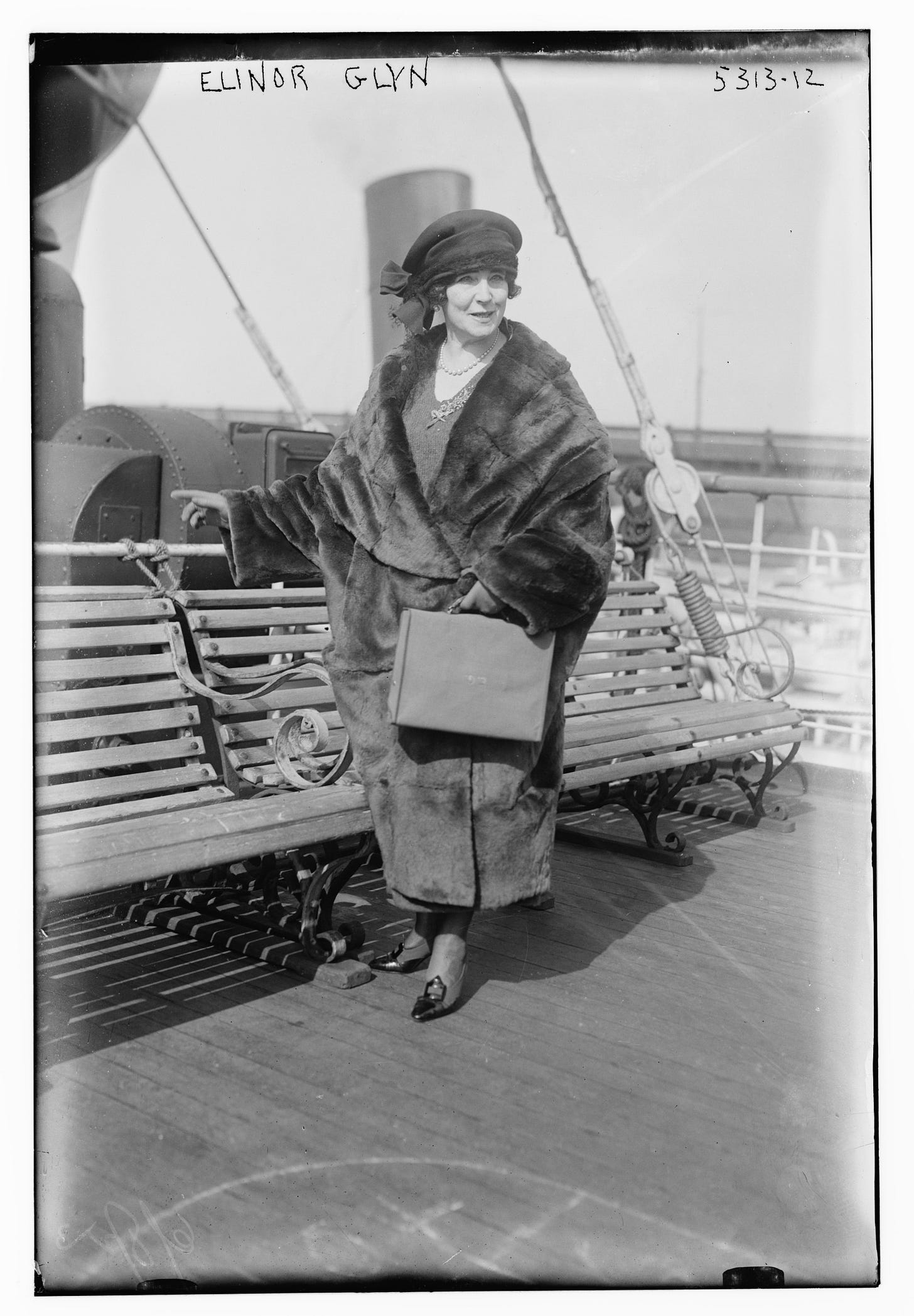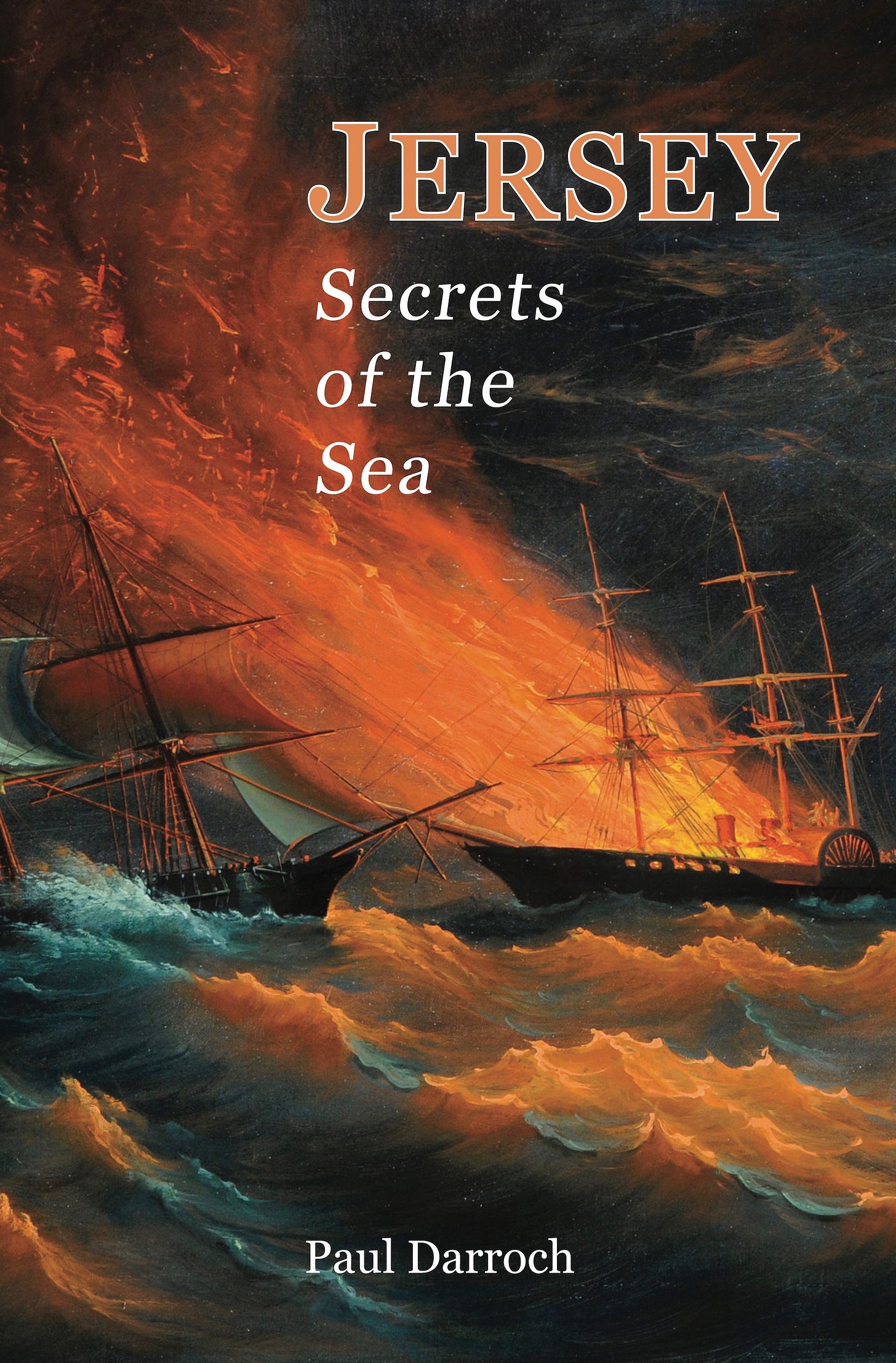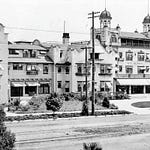In this episode, we complete the story of Elinor Glyn, the Jersey girl who achieved international celebrity and reached the pinnacle of Hollywood in the Roaring Twenties. She had gained earthly fame, yet at what cost?
Early Hollywood left an indelible mark on those in its orbit, far deeper than the noxious mercury vapours from the Cooper-Hewitt lamps that stained even Elinor’s red hair a violent purple. The allure of the West Coast sucked in a swarm of writers and swindlers, moneymen and showgirls, tycoons on the make, hunters and their prey. This was a gold rush as fatal and alluring as the mad old days of 1849; the spell of California promising untold wealth to the ferociously ambitious with nothing to lose but their souls.
The paranoia and fearful undercurrents of Hollywood gradually corroded Elinor’s frail peace of mind. Gradually Elinor Glyn, ever attuned to the esoteric, believed that the entire West Coast was caught in the grip of an ancient curse. The first symptoms she noted, that became immediately evident upon arrival in Hollywood, were a “sense of exaggerated self-importance and self-centredness”. The next stage, to which she pleaded guilty, was a sudden and consuming obsession with making money. She herself realised she had become infected with the virus. The final and fatal stage, Elinor argued, was utter moral bankruptcy.
Hollywood indeed consumed so many of its children. Morphine, moonshine and mistresses flourished in the hothouse atmosphere of the West Coast. Was Elinor simply blinded by the Klieg lights, those dazzling studio arc lamps that burned the eyes of many a star? Elinor already suspected she had drunk a little too deeply of the mad, befuddling wine of celebrity, long before she ever set sail on a yacht called the Oneida, on a tragic voyage that would enter into the legends of Hollywood noir.
Yet in 1927 she had one magical swansong to bestow, the movie ‘It’. Starring the irrepressible Clara Bow, this was Elinor Glyn’s masterpiece. The concept of the “It Girl” – someone blessed with innate, effortless charm and magnetism – has since become part of the English language.
Bow was an inspired piece of casting; a devastatingly charismatic young woman who seemed utterly modern in her self-reliance and sheer verve. The movie’s sassy star helped It make a million dollars in profit, and sealed Elinor’s reputation in Hollywood. The “It Girl”, as much as the Charleston dance or the Flapper, became a cultural phenomenon and sign of the times.
“It” had always been the animating spirit of all of Elinor’s romances, a poetic short hand for a magnetic allure and beguiling appeal that transcended the purely physical. The Roaring Twenties were made for the It Girls. This was the Jazz Age, an era of effortless style, easy money and easier morals, and Elinor Glyn captured its heart.
Yet by now Elinor herself was playing another role, of victim. It was famously said that she was never offered a contract she wouldn’t sign. She foolishly allowed herself to be seduced by a succession of charming and financially manipulative young men. Bleeding money, she retreated from the West Coast.
She attempted to recreate her magic in England; but far from the technical mastery of Hollywood, her motion pictures proved dismal failures. Virtually bankrupt and alone, she was compelled to write her engaging and intimate autobiography, Romantic Adventure, to stave off the renewed threat of destitution. Her beautiful dream was over.
In the end, there was just one more pilgrimage Elinor Glyn could make. In February 1939, this elderly woman returned to Jersey, the Island of her birth, for the first time in over fifty long years. It was a triumphant homecoming. Great parties were held in her honour; the Bailiff presented her with the Great Seal of the Island. Elinor toured her old haunts; privately cherishing the glimpse of the parapet where she had once shared her first kiss with an Eton boy.
The Jersey Evening Post, on 10th February 1939, prominently reported the talk that Elinor Glyn delivered to the Rotary Club in the Halkett Hotel next to Royal Square. She charmed the audience with her childhood memories of the Island. She fondly recalled falling asleep on the footstall as a little child during tedious sermons at St Mark’s Church. She explained how strangely familiar it felt, to climb the staircase at Government House. Fifty years had merely been the blink of an eye. That was the place where she sneaked under a table with her sister and a friend to catch a glimpse of the impossibly glamorous Lillie Langtry. A giggle gave them away; but the divine Mrs. Langtry promised to say nothing, and even ordered some supper for the little girls. Elinor’s homecoming speech ended in hearty applause.
Elinor’s public stance was one of pride and gratitude to the Island of her birth. Privately, she found the return visit profoundly disturbing. She felt standards had slipped; Government House seemed a shadow of its former eminence. The Jersey of her childhood had grown cramped and small, full, she wrote of “bad, petty and envious vibrations”. St Helier now seemed a cramped and diminished place compared to the exhilarating space and seductive vistas of California. The curse of the West Coast had left an indelible mark.
Elinor searched in vain for the house where she was born, but it had long gone. Everything had changed for the worse; her childhood world had irredeemably fled. She appreciated the flowers and kindness from her native Island, but in the end parted with a sad and tormented farewell. She wrote privately: “I remember now feeling on the boat in 1888 when we finally left, the prison doors were opening at last…. I never wish to go back again”.
She never did. As Nazi bombs pummelled London and her birthplace fell into the shadow of the Occupation, Elinor Glyn gradually slipped away. Some of her very last letters were to William Randolph Hearst and Marion Davies, sent from battered, blacked-out London and winging far away to their glittering Californian palace at San Simeon. Elinor fell into the shadow of her own memories.
Elinor Glyn
London, September 1942
“We live as we dream, alone”. Every night the black mountain-tides of Jersey are raging in my nightmares, flooding towards me, and seeking to drag me under. I am gasping for breath, fighting for life, so I wake. Even as the night terrors fade, I listen to the deadly symphony of the small hours; the spine-tingling wail of the air raid sirens and the dull thud of the German bombs.
The sky is on fire here every night. I am almost bed-ridden, bent double in a silken prison. Still, I often press my face to the window and spy the curtains of flame sweeping westward across the heart of the city. London is a like a bloodied boxer, slugged hard to the ground, losing a tooth or an eye, but fighting back with fury against the darkness. I am so proud. I shall not yield either, so my gas mask remains neatly boxed under the dressing table. I simply lie on my bed, listening to the murderous thunder, waiting to see if I will suddenly burn.
At first, they wanted to evacuate me to the country, and while the raids were at their fiercest, I did retreat to my old house at Miskin Manor. Yet I could not stay, for every room was shrieking with memories. I could no longer face the deathly corridor where my mother once paced like a wizened ghost, a pale old lady with cap and cane who would not let me be. I cannot escape her, though, for in these latter days, I have become her. The royal romances, the tiger skins and seductive vistas of Hollywood have all led here, to this lonely room full of memories.
They say lately that the news is better; the fortunes of war are turning. The radio tells of vast, hellish battles, of thousands of tanks colliding and clashing on the great Russian plains. I drift away through the unruly continents of my own mind. I remember those ice-draped palaces of Moscow, the golden troikas gliding like swans across the snowfields. I remember the feasts, the fabulous balls, the revels of the old regime. Those palaces burned long ago, under a red star. My hosts were shot at dawn.
I sometimes feel that all the beauty in the world has fled. At the height of my fame, I travelled to Rawhide, Nevada, to dine with the goldminers, the finest nobles of the earth. It was one of the proudest moments of my life as I held court with those decent, honest men. One of those gallant gentlemen even rode ninety miles across the desert, just to present me with a bunch of yellow daisies. Today that gold-rush town has been swallowed up by the earth, the empty schools and hotels looming in the swirling dust. I recall the eerie lines from Shelley I read so long ago in the library at Richelieu in Jersey: Nothing beside remains.

The California Curse has devoured me from within. For a fleeting, capricious moment, I stood at the pinnacle of Hollywood, as Clara Bow wowed the world and my films grossed a million dollars apiece. For a time, I even believed I could simply speak riches into the world as if by a golden spell. Now silent films are history, an embarrassment. All my wealth has seeped away like water, like dear old Clayton’s before me, flowing back to the silent places of the earth.
This is how it was always going to end. I think of Lucy, my beautiful, late sister. I think of her standing on the gangway to the Titanic, blissfully unaware of what was to come, never knowing the voyage that lay ahead. I will be joining her soon on her final journey.
I am weary of it all now, locked in this gilded cage, too exhausted to reveal my face in the world again. The detritus of my life is scattered all around me, in golden caskets crammed with memories. The silk canopy of my bed, the silver-heart shaped mirror on my dressing table; these are trinkets and jewels from a half-forgotten world. I sent a last letter to Marion Davies in Hollywood yesterday, and my shaking hands could barely grasp the pencil to shape each letter. After so long, even my words are being stolen from me.
No matter, for all my stories are told. All the weddings are done, the confetti spilt, and the heroes are living happily ever after, or lying in coffins from the wars. I hear all their voices crowding in my dreams, a cacophony of beauty and life, like radio broadcasts from a distant star. The tiger skin is packed away, forgotten, waiting for another age. Romance is my lodestar, but now the dream is done.
Far above my silken shroud, the searchlights scour the sky, bringing false dawn, reminding me of the distress flares I once saw above a sinking ship, the steamship to Jersey, on a barren rock so long ago. I am confused and befuddled, my spirit broken. I glance for a last time into the silver mirror, in the clear moonlight.
The face of the old, withered woman is gone. Staring back are the red tresses and shining green eyes of a little shipwrecked girl, perched on that rocky ledge, waiting for the waves to come. The waters are lapping at her feet now, the storm tide is roaring in, and soon she will slip away into the night.
This extract is taken from Jersey: Secrets of the Sea, available on Amazon and in all good Jersey bookstores. The music is Chariots by Gavin Luke, courtesy of Epidemic Sound.













